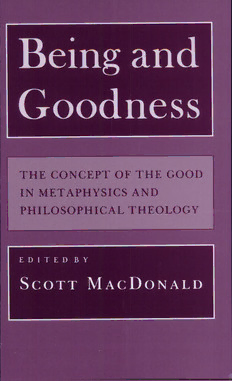Table Of ContentBeing and Goodness
Being and Goodness
THE CONCEPT OF THE GOOD
IN METAPHYSICS AND
PHILOSOPHICAL THEOLOGY
EDITED BY
Scott MacDonald
Cornell University Press
ITHACA AND LONDON
Copyright© 1991 by Cornell University
All rights reserved. Except for brief quotations in a review, this book, or
parts thereof, must not be reproduced in any form without permission in
writing from the publisher. For information, address Cornell University
Press, 124 Roberts Place, Ithaca, New York 14850.
First published 1991 by Cornell University Press.
International Standard Book Number o-8014-2312-o
Library of Congress Catalog Card Number 90-55197
Printed in the United States of America
Librarians: Library of Congress cataloging information
appears on the last page of the book.
I§ The paper in this book meets the minimum requirements
of the American National Standard for Information Sciences
Permanence of Paper for Printed Library Materials, ANSI Z39·48-1984.
This book is a print-on-demand volume.
It is manufactured using toner in place of ink.
Type and images my be less sharp than the same
material seen in traditionally printed
Cornell University Press editions.
Contents
Contributors
Vll
Abbreviations for Frequently Cited Texts
lX
Introduction: The Relation between Being
and Goodness
Scott MacDonald
Part One: The Concept of the Good in Metaphysics
The Metaphysics of Goodness and the Doctrine
of the Transcendentals
Scott MacDonald
2 Good as Transcendental and the Transcendence
of the Good
Jan A. Aertsen
3 Saint Thomas on De hebdomadibus
Ralph Mcinerny 74
4 Being and Goodness
Eleonore Stump and Norman Kretzmann g8
5 The Transcendentality of Goodness and the
Human Will
Mark D. Jordan 129
v
I
vi Contents
6 Evil and the Transcendentality of Goodness: Suarez's
Solution to the Problem of Positive Evils
Jorge J. E. Gracia 151
Part Two: The Concept of the Good in Philosophical Theology
7 Aquinas on Faith and Goodness
Eleonore Stump 179
8 A General Problem of Creation: Why Would God Create
Anything at All?
Norman Kretzmann 208
9 A Particular Problem of Creation: Why Would God
Create This World?
Norman Kretzmann 229
1 o The Best of All Possible Worlds
William E. Mann
11 Metaphysical Dependence, Independence,
and Perfection
Thomas V. Morris
Appendix: Boethius's De hebdomadibus
Translated by Scott MacDonald 299
Bibliography
Index
Contributors
jAN A. AERTSEN is Professor of Medieval Philosophy and Modern Cath
olic Philosophy at the Free University, Amsterdam.
JoRGE J. E. GRACIA is Professor of Philosophy at the State University of
New York, Buffalo.
MARK D. JoRDAN is Associate Professor in the Medieval Institute at the
University of Notre Dame.
NORMAN KRETZ MANN is Susan Linn Sage Professor of Philosophy at
Cornell University.
ScoTT MACDONALD is Associate Professor of Philosophy at the Univer
sity of Iowa.
RALPH MciNERNY is Michael P. Grace Professor of Medieval Studies at
the University of Notre Dame.
WILLIAM E. MANN is Professor of Philosophy at the University of
Vermont.
THOMAS V. MoRRIS is Associate Professor of Philosophy at the U niver
sity of Notre Dame.
ELEONORE STUMP is Professor of Philosophy at Virginia Polytechnic
Institute and State University.
Vll
Abbreviations for
Frequently Cited Texts
CH Bonaventure, Collationes in Hexaemeron
DH Boethius, De hebdomadibus
Disp. Francisco Suarez, Disputationes metaphysicae
DM Thomas Aquinas, De malo
DN Albert the Great, Super Dionysium De divinis nominibus
DP Thomas Aquinas, De potentia
DV Thomas Aquinas, De veritate
/MD Bonaventure, ltinerarium mentis in Deum
InDH Thqmas Aquinas, In Boetii De hebdomadibus expositio
In Sent. Bonaventure, Commentarium in Sententias
PL Patrologiae Latinae Cursus Completus
SB Albert the Great, Summa de bono
sec
Thomas Aquinas, Summa contra gentiles
SENT Albert the Great, Commentarii in libros Sententiarum
ST Thomas Aquinas, Summa theologiae
Super Sent. Thomas Aquinas, $criptum super Sententias
lX
Being and Goodness
INTRODUCTION
The Relation between
Being and Goodness
Scott MacDonald
Since the tg6os scholarship in medieval philosophy has begun to
flourish, and the field now displays such vigor that it seems reasonable
to hope that we will soon witness a recovery and appreciation of medi
eval philosophy equal to that already achieved in the neighboring fields
of ancient and early modern philosophy. The attention now being
given to philosophy in the Middle Ages is unprecedented, but the
recovery and evaluation of the medieval philosophical achievement is
only just beginning: most medieval philosophical texts have not yet
received critical editions, let alone translation or the sort of philosophi
cal commentary and analysis that would open them up to the contem
porary philosophical community. Hence, we remain ignorant of many
of the positions and arguments central to a tradition comprising a
thousand years of our philosophical heritage. This collection of essays
is intended as a first step toward removing that ignorance with respect
to one important topic, the metaphysics of goodness.
A long and rich philosophical tradition, stemming from ancient
Greek philosophy and running through the Middle Ages, has been
guided by the intuition that there is some sort of interesting necessary
connection between being and goodness. This intuition has come to the
surface in the history of philosophy in various ways. Plato argued, for
example, that the Form of the Good gives being to all the other Forms;
Aristotle maintained that the good is spoken of in as many ways as
being; Augustine's famous doctrine that evil is merely the privation of
good is a corollary of his view that everything that exists is good insofar
as it exists; and thirteenth-century philosophers such as Albert the

